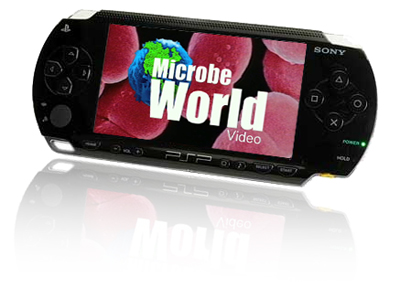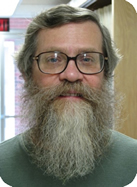WHAT'S NEW
Meet the Scientist: Seth Darst, Ph.D. Seth Darst is a professor of Molecular Biophysics at the Rockefeller University in New York city, where his research centers on RNA polymerase, the enzyme at the heart of a cell's ability to make protein from a set of DNA instructions.
Seth Darst is a professor of Molecular Biophysics at the Rockefeller University in New York city, where his research centers on RNA polymerase, the enzyme at the heart of a cell's ability to make protein from a set of DNA instructions.
In this interview, Dr. Merry Buckley talks with Dr. Darst about how he got his start in research, whether computers will eventually be able to predict complex protein structures, and why eager young scientists shouldn't miss their chance at postdoctoral training. (Read more...)
To listen, click the play button next to the title of this entry. You can subscribe for free to Dr. Merry Buckley's Meet the Scientist podcast via iTunes or through the RSS feed with a podcast aggregator or feed reader of your choice.
MicrobeWorld Video Now Formated for Sony's PSP

All episodes of MicrobeWorld Video are now formatted for play on Sony's popular Play Station Portable gaming device. To get episodes of MicrobeWorld Video on to your PSP, right-click on any "PSP" link and select "save-as". This will download the video file to your computer. Next, connect your PSP via USB port and drag the video file into the video folder on your PSP's Memory Card.
To see the complete archives of MicrobeWorld Video click here.
Meet the Scientist: Ralph Tanner, Ph.D.
 Ralph Tanner, a professor of microbiology at the University of Oklahoma, focuses his research on anaerobes in the environment and putting those bacteria to use in industry.
Ralph Tanner, a professor of microbiology at the University of Oklahoma, focuses his research on anaerobes in the environment and putting those bacteria to use in industry.
He develops useful microbial catalysts for biofuel production from sustainable crops and has extended our knowledge of microbial diversity by isolating a number of new genera and species with novel physiologies. He helped define the phylogeny of bacteria. (Read more...)
For a more in-depth interview, click play to listen to Dr. Merry Buckley interview Dr. Tanner about his work producing biofuels from burnt plant material, the future of biofuels in the U.S., whether bacterial systematics might be forced to change in light of new research on recombination, and about his approach to teaching microbiology. You can subscribe for free to Dr. Merry Buckley's Meet the Scientist podcast via iTunes or through the RSS feed with a podcast aggregator or feed reader of your choice.
MicrobeWorld Video 19 - West Nile Virus
iPod | Quicktime | iPhone | MPG4 | Apple TV | Cell | DIVX | WMV | PSP
West Nile virus entered the United States in 1999 and is now considered a seasonal epidemic that starts in the summer and continues into the fall. First isolated in Uganda in 1937, the virus can cause severe human meningitis or encephalitis in 1% of those infected. In 2007 the U.S. Centers for Disease Control reported 124 fatalities. The rapid spread of West Nile virus has put local and state mosquito surveillance programs on the front line of public health and disease preparedness.
In this episode, MicrobeWorld Video interviews Dr. Jorge Arias, an expert in vector-borne diseases of the Americas. Arias currently serves as the Environmental Health Supervisor of the Fairfax County Health Department in Northern Virginia. In this role, he is responsible for directing the Disease-Carrying Insects Program which focuses on West Nile virus and Lyme disease.
For more information about West Nile virus, please visit:
This episode was filmed at the Marian Koshland Science Museum, the Fairfax County Health Department, Huntley Meadows Park in Fairfax, Va., and the National Zoo in Washington, D.C.
MicrobeWorld Video 18 - The One Health Initiative
iPod | Quicktime | iPhone | MPG4 | Apple TV | Cell | DIVX | PSP
Ronald Atlas, former President for the American Society for Microbiology, discusses the new One Health Initiative that recognizes the inter-relationships among human, animal, and environmental health and seeks to enhance communication, cooperation, and collaboration in integrating these areas for the health and well-being of all species.
Development of the One Health Initiative began in 2007 with the American Veterinary Medical Association's (AVMA) efforts to strengthen communications and collaboration with colleagues in human medicine. The AVMA established a Task Force on this issue which released specific recommendations in July 2008. The American Medical Association (AMA) in June 2007 passed a resolution supporting the Initiative and strengthening collaboration between human and veterinary medicine in dealing with zoonotic diseases. Other endorsers include the U.S. Centers for Disease Control & Prevention (CDC) , American Medical Association, American Society of Tropical Medicine and Health (ASTMH), the American Phytopathological Society (APS), several smaller veterinary organizations, and over 300 individual scientists, including current and past leaders of the ASM.
Meet the Scientist: Connie Schmaljohn
 Connie Schmaljohn is Chief Scientist at the U.S. Army Medical Research Institute of Infectious Diseases in Fort Detrick, Maryland, where she develops vaccines for a number of viral diseases of interest to the military. She is currently working on a vaccine deliverd by a gene gun for hantaviruses that cause hemorrhagic fever with renal syndrome. (Read more...)
Connie Schmaljohn is Chief Scientist at the U.S. Army Medical Research Institute of Infectious Diseases in Fort Detrick, Maryland, where she develops vaccines for a number of viral diseases of interest to the military. She is currently working on a vaccine deliverd by a gene gun for hantaviruses that cause hemorrhagic fever with renal syndrome. (Read more...)
MicrobeWorld Video 17 - Return to Zambia
The American Society for Microbiology is helping African nations foster a scientific community that is better able to address the current and future problems that threaten not only the local population, but the world at large.
Like many African countries, Zambia and South Africa are deeply affected by HIV and tuberculosis, as well as a number of other infectious diseases.
In March of 2008, ASM President Cliff Houston, Ph.D., traveled to Zambia and South Africa to gauge and assess the Society’s efforts to transfer knowledge and state of the art diagnostic technology training support in laboratories, schools and universities, and to assist in meeting the goals for care and treatment of people living with TB and HIV in these resource-limited countries.
Please feel free to embed or distribute this video.
Meet the Scientist: Liis-anne Pirofski, M.D.

Liise-anne Pirofski is the Chief of the Division of Infectious Diseases in the Department of Medicine at the Albert Einstein College of Medicine. Her research deals with the role of the immune system in susceptibility to pathogens like Cryptococcus neoformans and Streptococcus pneumoniae. By studying the interactions between so-called “naturally occurring” and “memory” B-cells with microbes, Pirofski's focus at the moment is predominantly on an effort to understand how the antibody repertoire is shaped and functions in innate immunity. (Read more...)
MicrobeWorld Video 16 - Canary in a Coal Mine
iPod | Quicktime | iPhone | MPG4 | Apple TV | Cell | DIVX | PSP
Subscribe to MicrobeWorld Video through iTunes or Miro. MicrobeWorld Video is now formated for Apple TV, iPhone and the Video iPod.
Coral reefs are dying a death of a thousand cuts and their disappearance threatens not only the incredibly diverse ecosystem that depends on them, but also human health and welfare.
In this episode of MicrobeWorld Video marine scientists Ove Hoegh-Guldberg, Ph.D., chair of marine studies at the University of Queensland in Brisbane, Australia, and Kiho Kim, Ph.D., director of the environmental studies program at American University, explain the important relationship between microbes and corals, and how this delicate symbiosis that sustains life on and around reefs is facing numerous threats from human interactions to global climate change. In addition, Tundi Agardy, Ph.D., founder and executive director of Sound Seas, discusses the need for public policy and community-based conservation efforts that may help stave off the degradation of these vital ocean ecosystems.
According to a 2004 report issued by the World Wildlife Fund, 24% of the world's reefs are under imminent risk of collapse through human pressures; and a further 26% are under a longer term threat of collapse. If nothing is done to protect these resources, many scientists estimate that reefs around the West Indies in the Caribbean will be gone by 2020, while the Great Barrier Reef may only last for another three decades.
Please visit the following sites for more information about coral reefs:
Please feel free to embed or distribute this video.





